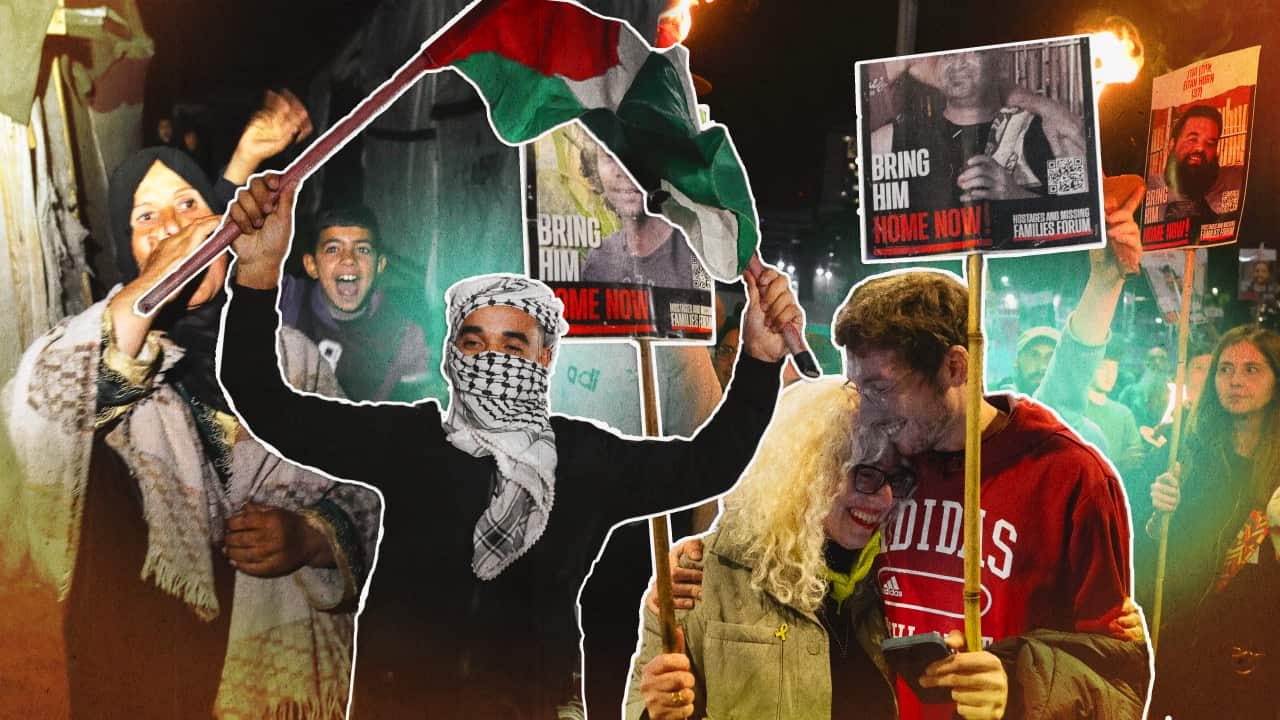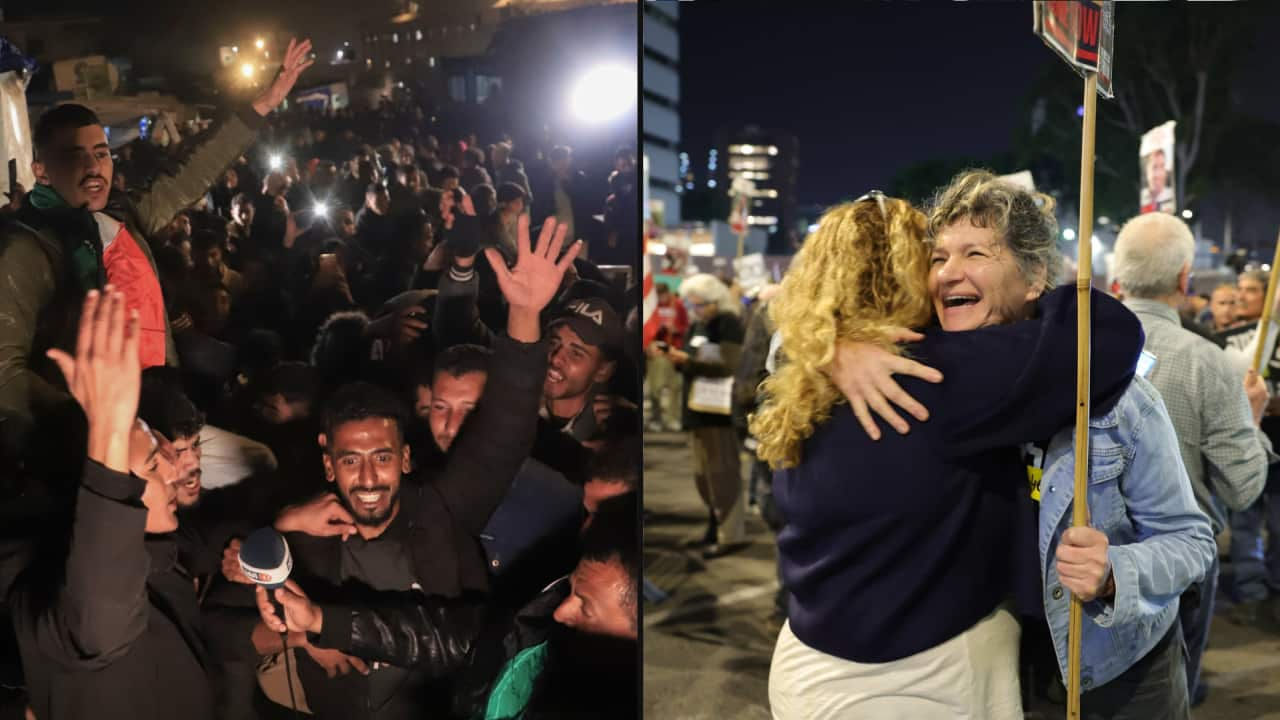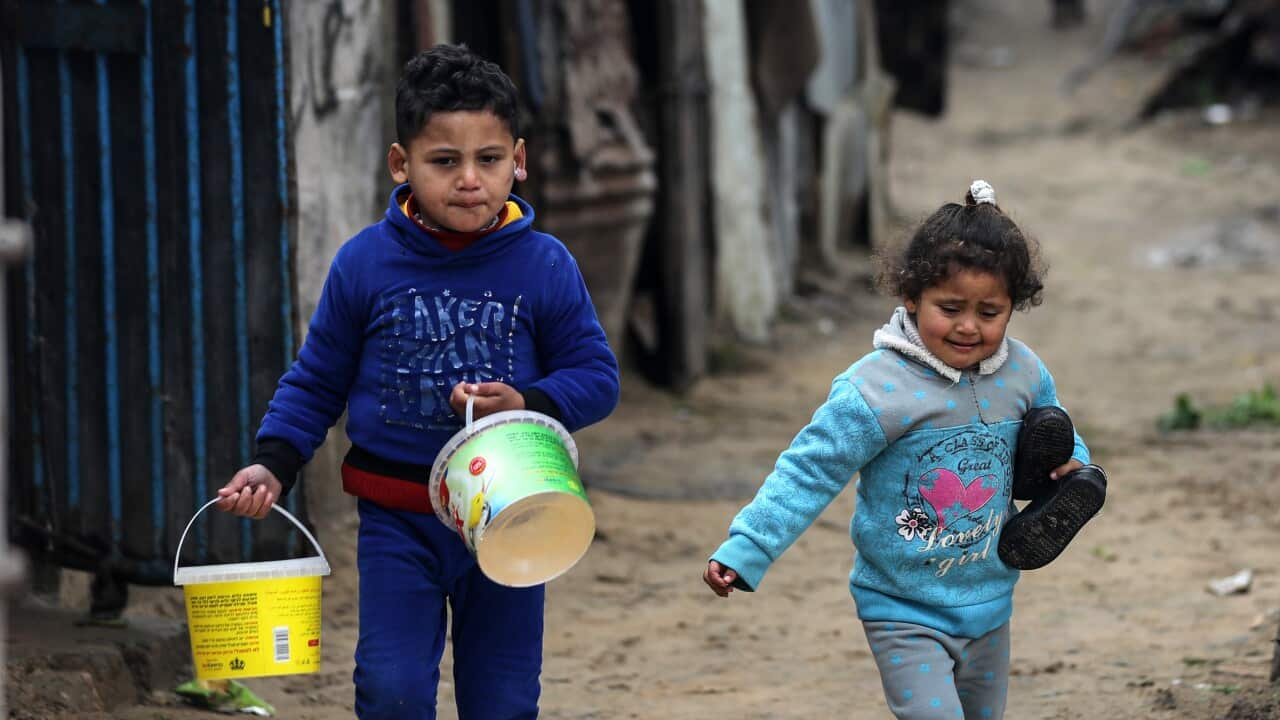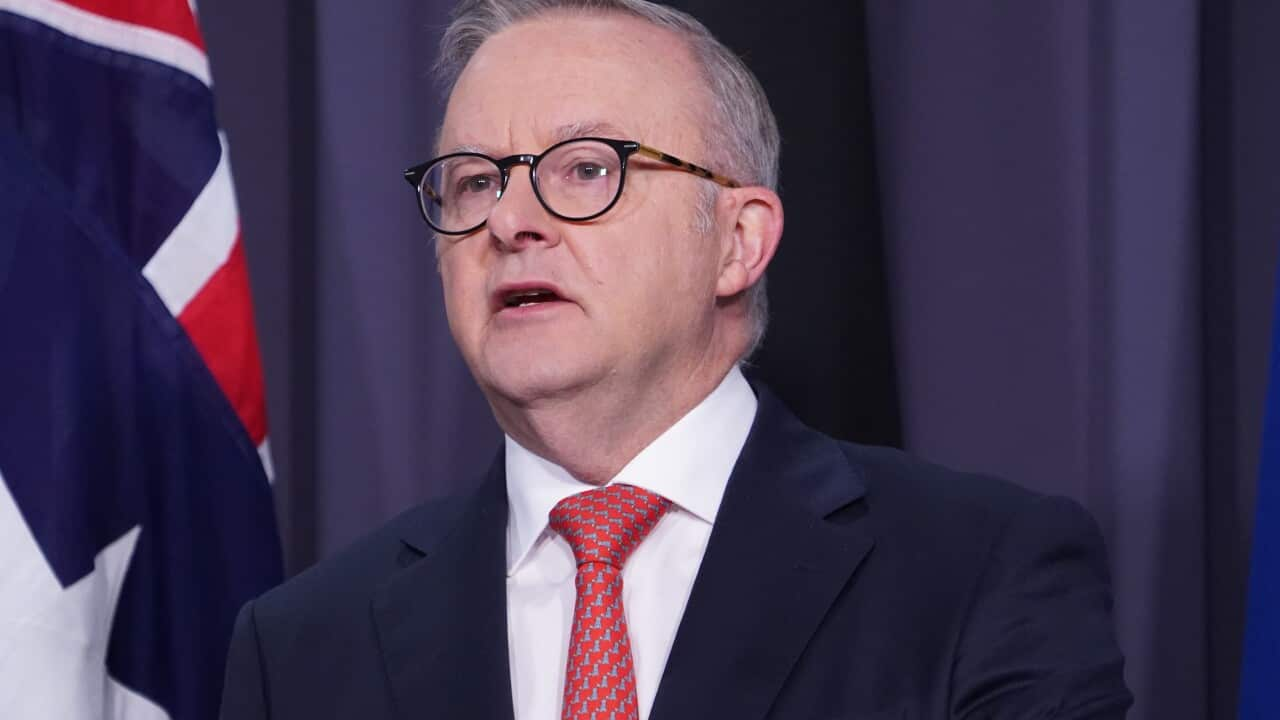Key Points
- Benjamin Netanyahu has now said his cabinet will approve a ceasefire deal between Israel and Hamas.
- Israel's acceptance of the deal won't be official until it's approved by its security cabinet and government.
- Israeli airstrikes have killed more than 80 since the deal was announced, according to Gaza's civil defence agency.
The office of Israeli Prime Minister Benjamin Netanyahu has said that a "deal to release the hostages" had been reached — after delaying a cabinet vote on the ceasefire between Israel and Hamas — and that he had ordered the political-security cabinet to convene later in the day.
"Prime Minister Benjamin Netanyahu was informed by the negotiating team that agreements have been reached on a deal to release the hostages," his office said in a statement.
His office accused Hamas on Thursday of reneging on key parts of the agreement to extort last-minute concessions — an allegation Hamas denied.
"The prime minister ordered the political-security cabinet to convene tomorrow (Friday). The government will then convene to approve the deal," Netanyahu's office said.
It added that the families of the hostages had been informed and that preparations were being made to receive them upon their return.
If approved by Israel's cabinet, the truce agreement would start on Sunday and involve the exchange of Israeli hostages for Palestinian prisoners, after which the terms of a permanent end to the war would be finalised.
Israel had delayed holding a cabinet meeting to ratify a ceasefire with Hamas, blaming the militant group for the hold-up, as Palestinian authorities said Israeli airstrikes had killed dozens in Gaza since the announcement of a ceasefire deal on Thursday.
The day after the truce announcement, Israel launched some of its most intense bombardment of Gaza in months, with Palestinian authorities saying at least 86 people were killed within a day of the truce being unveiled.
The Israeli military is looking into the reports, a military spokesperson said.
Hamas senior official Izzat el-Risheq said the group remained committed to the ceasefire deal that was scheduled to take effect from Sunday to bring an end to 15 months of bloodshed in Gaza.
Hamas political bureau member Sami Abu Zuhri said there was "no basis" for Israel's accusations that the group had held up negotiations.
US secretary of state Antony Blinken had earlier said it was expected that the ceasefire would start on Sunday as planned, despite the need for a "loose end" to be tied up by negotiators.
"It's not exactly surprising that in a process and negotiation that has been this challenging and this fraught, you may get a loose end," Blinken told a news conference in Washington.
US President Joe Biden's envoy Brett McGurk and President-elect Donald Trump's envoy Steve Witkoff were in Doha with Egyptian and Qatari mediators working to resolve the last remaining dispute, a US official, who spoke on condition of anonymity, said.
The dispute involved the identities of several prisoners Hamas is demanding to be released.
The complex ceasefire accord emerged on Wednesday after mediation by Qatar, Egypt and the US to stop the war that has devastated the coastal territory and inflamed the Middle East.
The deal outlines a six-week initial ceasefire with the gradual withdrawal of Israeli forces from the Gaza Strip, where tens of thousands have been killed.
Hostages taken by militant group Hamas, which governs the enclave, would be freed in exchange for Palestinian prisoners detained in Israel.
The deal also paves the way for a surge in humanitarian aid for Gaza where the majority of the population has been displaced and is facing acute food shortages, food security experts warned late last year.
Rows of aid trucks were lined up in the Egyptian border town of El-Arish, waiting to cross into the Gaza Strip once the border is reopened.
Israel's acceptance of the deal will not be official until it is approved by the country's security cabinet and government.

Benjamin Netanyahu's office has accused Hamas of holding up the ceasefire agreement, which the militant group has denied, saying there is "no basis" for the accusation. Source: AAP, AP / Abir Sultan
Finance Minister Bezalel Smotrich said it was a "dangerous deal", while ultranationalist national security minister Itamar Ben-Gvir has threatened to quit the government if the ceasefire is approved.
Smotrich's Religious Zionism Party has itself threatened to quit government if Israel did not go back to war against Hamas after the first six-week phase of the ceasefire was completed.
The accord requires 600 truckloads of humanitarian aid to be allowed into the Gaza Strip every day of the ceasefire, with 50 carrying fuel.
The first phase of the agreement also has Israel releasing more than 1,000 Palestinian prisoners, including many long-serving inmates.
'Tears of joy'
After the truce deal was first announced on Thursday, there were celebrations but also anguish in Israel and Gaza.
Saeed Alloush, who lives in north Gaza, said he and his loved ones were "waiting for the truce and were happy", until overnight strikes killed many of his relatives.
"It was the happiest night since October 7" until "we received the news of the martyrdom of 40 people from the Alloush family", he said.
In Tel Aviv, pensioner Simon Patya said he felt "great joy" that some hostages would return alive, but also "great sorrow for those who are returning in bags, and that will be a very strong blow, morally".
If successful, the ceasefire will halt fighting that has razed much of heavily urbanised Gaza and displaced most of the enclave's pre-war population of 2.3 million.
That, in turn, could defuse tensions across the wider Middle East, where the war has stoked conflict in the Israeli-occupied West Bank, in Lebanon, Syria, Yemen and Iraq, and raised fears of all-out war between Israel and Iran.
Phase one of the deal entails the release of 33 Israeli hostages, including all women, children and men over 50.
The agreement calls for a surge in humanitarian assistance to Gaza, and United Nations Secretary-General António Guterres stressed the "priority now must be to ease the tremendous suffering caused by this conflict".
Both the UN and the International Committee of the Red Cross said they were preparing to massively scale up their aid operations.
The pact follows months of on-off negotiations conducted by Egyptian and Qatari mediators, with the US backing, and comes just ahead of Trump's presidential inauguration next week.
'Constructive step towards peace'
Prime Minister Anthony Albanese welcomed the ceasefire agreement, urging all parties to respect its terms and safeguard a lasting peace.
"Australia welcomes the announcement of a ceasefire and hostage agreement in Gaza after 15 months of conflict and a devastating loss of civilian life," Albanese said on Thursday in a joint statement with Foreign Minister Penny Wong.
"Our thoughts are with all the civilians killed, displaced and taken hostage in this conflict, and the many humanitarian workers who lost their lives in the service of others."
Speaking on Sky News on Thursday night, Wong said she hopes momentum from a ceasefire deal will deliver longer-term peace in the Middle East, and mean political tensions in Australia tone down.
"It's been a really difficult conflict for not just for those in the region, for the many people who've lost their lives, tens of thousands of people, but people around the world, and we're, you know, unfortunately, also here in Australia, we've had very different views about this conflict," she said.
"I think this is really important opportunity for us to take the temperature down, and you know, political leaders have a role in that," she said, naming Opposition leader Peter Dutton and Greens leader Adam Bandt.
LISTEN TO

What does the proposed ceasefire mean for Jewish and Palestinian communities in Australia?
SBS News
03:10
Dutton said the news is positive but added it's important to ensure all hostages are released before looking to the future.
Bandt said the deal is long overdue and that Labor must now take more action to call for a permanent ceasefire and recognition of Palestinian statehood.
Egyptian President Abdel Fattah El-Sisi welcomed the agreement in a post on X, as did leaders and officials from the US, United Kingdom, Türkiye, Jordan, Germany and the United Arab Emirates, among others.
The path ahead
The road ahead is complex, with political minefields likely. Israeli hostage families expressed concerns the accord may not be fully implemented and that some hostages may be left behind in Gaza.
Negotiations on implementing the second phase of the deal will begin by the 16th day of phase one, and this stage is expected to include the release of all remaining hostages, a permanent ceasefire and the complete withdrawal of Israeli forces from Gaza.
The third stage is expected to address the return of all remaining bodies and the start of Gaza's reconstruction supervised by Egypt, Qatar and the UN.
Trump said he would use the ceasefire deal as momentum to expand the Abraham Accords — a series of US-backed bilateral agreements struck during his first presidency in 2017-2021 that normalised Israel's relations with several Arab countries.
If all goes smoothly, the Palestinians, Arab states and Israel must still agree on a vision for post-war Gaza, a formidable challenge involving security guarantees for Israel and many billions of dollars in investment for reconstruction.
Al-Sisi underscored the "importance of accelerating the entry of urgent humanitarian aid" into Gaza.
Egypt said it was ready to host an international conference on the reconstruction of the Gaza Strip, which the UN has said would take more than a decade to rebuild civilian infrastructure.
The World Health Organization's representative in the Palestinian territories, Rik Peeperkorn, said on Thursday that at least US$10 billion ($16 billion) would probably be needed over the next five to seven years to rebuild Gaza's devastated health system alone.
The UN Palestinian refugee agency UNRWA, facing an Israeli ban on its activities set to start later this month, welcomed the ceasefire deal.
"What's needed is rapid, unhindered and uninterrupted humanitarian access and supplies to respond to the tremendous suffering caused by this war," UNRWA head Philippe Lazzarini wrote on X.
Who will run Gaza after the ceasefire?
Israel has rejected any involvement by Hamas, which has governed Gaza since the most recent elections in 2006.
However, Israel has been almost equally opposed to rule by the Palestinian Authority, the body set up under the Oslo Interim Peace Accords three decades ago that has limited governing power in the West Bank.
Israel has bombarded Gaza since Hamas' October 7 attack in which more than 1,200 people, including an estimated 30 children, were killed and over 200 hostages taken, according to the Israeli government. More than 46,000 people have been killed in Gaza since October 7, according to the health ministry in Gaza.
The October 7 attack was a significant escalation in the long-standing conflict between Israel and Hamas








